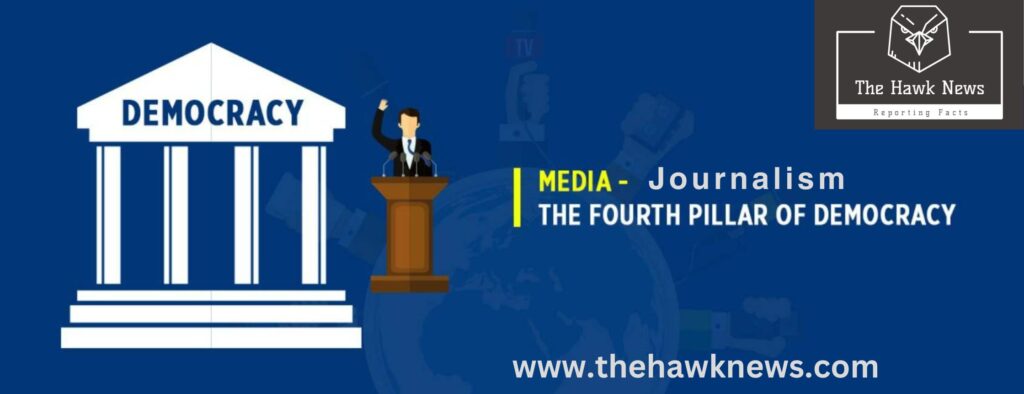
In the intricate architecture of democracy, journalism stands as the indispensable Fourth Pillar, a beacon of truth and accountability. As the guardian of public interest, journalism plays a pivotal role in shaping the societal narrative, fostering transparency, and holding power accountable.
Through the relentless pursuit of truth, journalists become the voice of the people, unveiling the realities that underpin the democratic fabric. In this ever-evolving landscape, the Fourth Pillar adapts, leveraging technology and embracing new mediums to disseminate information.
This introductory glimpse into the essence of journalism as the Fourth Pillar delves into its historic significance, contemporary challenges, and its enduring commitment to safeguarding the principles upon which democracy thrives.
Defining the Fourth Pillar: Unraveling the Essence of Journalism
The Fourth Pillar of democracy, journalism, is not merely a conduit of information but the bedrock of an informed and engaged society. Its essence lies in the relentless pursuit of truth, serving as the watchdog that scrutinizes power, unveils societal realities, and upholds the principles of transparency and accountability.
As a formidable force, journalism goes beyond reporting; it shapes public discourse, cultivates awareness, and fortifies the democratic foundation. In unraveling the essence of this Fourth Pillar, one discovers a commitment to truth, a dedication to the public’s right to know, and an unwavering resolve to foster an informed citizenry crucial for the vitality of any democratic society.
Guardians of Truth: The Vital Role of Journalists in Democracy
Journalists, the unsung heroes of democracy, stand as vigilant guardians of truth, navigating the intricate landscape between power and the people. Their vital role extends beyond reporting; they are the torchbearers illuminating the path to an informed citizenry.
In a democracy, the press serves as a critical check on authority, uncovering corruption, exposing injustices, and ensuring accountability. Journalists, armed with the pen as their sword, empower citizens with knowledge, enabling them to make informed decisions.
As guardians of truth, journalists embody the principles that underpin democracy, fostering a society where transparency and the pursuit of justice flourish.
Beyond Headlines: Journalism’s Impact on Public Awareness
Journalism transcends the surface of headlines, diving deep to mold the collective consciousness of a society. Its impact on public awareness is profound, extending beyond fleeting news cycles. Journalists serve as interpreters, dissecting complex issues to distill vital information for the public.
Through in-depth investigations, they unearth stories that resonate, fostering empathy and understanding. Journalism ignites conversations, fuels debates, and shapes perspectives, empowering citizens with the knowledge to engage meaningfully in civic life.
Beyond the sensational, it is the steady hand of journalism that guides public awareness, ensuring a well-informed populace capable of navigating the complexities of a rapidly evolving world.
Challenges Faced: Navigating the Dynamics of the Fourth Estate
The Fourth Estate, journalism, confronts a myriad of challenges as it navigates the ever-shifting dynamics of the modern world. Press freedom battles against censorship, misinformation proliferates, and economic pressures threaten editorial independence.
Journalists grapple with ethical quandaries in the pursuit of truth, while the digital age reshapes the traditional news landscape. Balancing immediacy with accuracy presents an ongoing struggle, and the evolving nature of technology demands constant adaptation.
Yet, in facing these challenges, the Fourth Estate persists, driven by an unwavering commitment to its pivotal role in democracy, determined to overcome obstacles and remain a stalwart guardian of truth and accountability.
Press Freedom: A Cornerstone for Democracy’s Stability
Press freedom stands as a cornerstone, integral to the stability of any democracy. It is the lifeblood that nourishes public discourse, fostering an environment where diverse voices can flourish. In democratic societies, an unfettered press serves as a watchdog, holding power accountable and illuminating the path towards transparency.
Challenges to press freedom undermine the very foundation of democracy, stifling the exchange of ideas and compromising the public’s right to know. Upholding this cornerstone is not just a journalistic duty; it is a collective responsibility to safeguard the democratic principles that rely on the free flow of information for their vitality and endurance.
The Evolution of Journalism: Adapting to Modern Democracies
In the dynamic tapestry of modern democracies, journalism undergoes a transformative evolution, adapting to the rapidly changing landscape. Traditional print gives way to digital realms, and social media becomes a powerful conduit for information dissemination.
The evolving nature of journalism reflects the diverse informational needs of a tech-savvy society. While challenges such as misinformation and the 24/7 news cycle emerge, journalism remains a crucial pillar, recalibrating its methods to ensure relevance and accuracy.
As technology continues to redefine communication, the evolving role of journalism serves as a linchpin in sustaining the informed, participatory citizenry essential for the health of modern democracies.
From Print to Pixels: How Technology Shapes the Fourth Pillar
The journey from print to pixels marks a seismic shift in how technology molds the Fourth Pillar of democracy—journalism. Traditional presses now share space with digital platforms, enabling instantaneous global reach.
Technology accelerates the news cycle, demanding agility from journalists to match the pace of information dissemination. Social media amplifies voices but poses challenges like misinformation. Yet, these digital tools empower journalists to engage a broader audience and foster interactive dialogues.
Navigating this digital landscape, journalism evolves, harnessing technology’s potential to bridge gaps, enhance accessibility, and fortify its role as the dynamic Fourth Pillar, resilient in the face of the ever-changing technological tide.